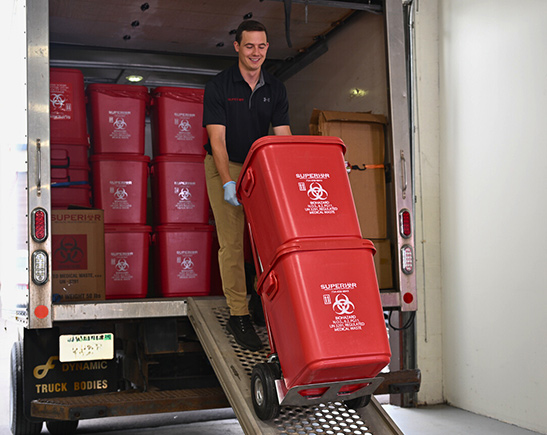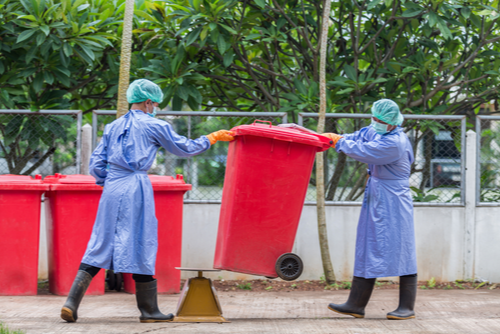Past Clean-up: Ensuring Safety with Specialist Medical Waste Removal
Past Clean-up: Ensuring Safety with Specialist Medical Waste Removal
Blog Article
Stay Compliant and Safe: Exactly How to Dispose of Medical Waste Properly
In today's ever-changing medical care landscape, making certain compliance and safety and security when it comes to clinical waste disposal is of utmost importance. In this discussion, we will certainly explore the different types of medical waste, the connected risks, the lawful requirements, and the finest practices for maintaining a risk-free and compliant clinical waste management system.
Value of Proper Clinical Waste Disposal
Correct clinical waste disposal is of utmost importance in ensuring the safety and security and wellness of both health care workers and the basic public. Medical waste, which consists of items such as made use of needles, polluted dressings, and ended medicines, presents major health risks otherwise handled and gotten rid of properly.

In addition, incorrect disposal of clinical waste can cause ecological contamination. When clinical waste is not segregated, dealt with, or disposed of correctly, it can find its method into landfills or bodies of water, possibly contaminating the water, dirt, or air resources. This can have harmful results on ecosystems and human health and wellness, as dangerous substances may leach into the setting or be released into the ambience.
Kinds of Clinical Waste and Their Threats
The varied variety of clinical waste produced by healthcare facilities provides different dangers that must be very carefully dealt with to make sure correct disposal and avoid potential harm to public wellness and the setting. Medical waste can be identified right into different categories based on its attributes and level of threat.
One type of clinical waste is infectious waste, that includes items that are contaminated with blood or various other possibly transmittable products. This can consist of used needles, syringes, and other sharp objects, in addition to tissues, swabs, and dressings from patients with transmittable diseases. Improper disposal of transmittable waste can result in the transmission of unsafe microorganisms and the spread of infections.
One more category is hazardous waste, that includes materials that are poisonous, flammable, harsh, or responsive. This can consist of chemicals, drugs, and particular clinical tools. Messing up or inappropriate disposal of contaminated materials can cause environmental contamination and position risks to the wellness of waste workers and the public.
Contaminated waste is an additional sort of clinical waste that should be carefully handled. This waste consists of materials that have radioactive materials, such as utilized radiation treatment sources or infected research laboratory products. Incorrect handling or disposal of contaminated waste can result in radiation direct exposure and significant wellness threats.
Lastly, non-hazardous general waste, such as paper, packaging materials, and food waste, is additionally produced by medical care facilities. While this waste might not position substantial risks, it still requires to be appropriately managed to maintain tidiness and avoid the attraction of insects.
To make certain the risk-free disposal of medical waste, healthcare facilities have to implement correct partition, storage space, transportation, and treatment techniques. This includes using proper containers, labeling, and training for team, as well as conforming with neighborhood guidelines and standards. By attending to the risks linked with various kinds of medical waste, health care centers can safeguard public wellness and the atmosphere.
Regulatory and legal Demands for Disposal
In order to ensure the safe and appropriate disposal of medical waste, health care centers need to adhere to lawful and governing needs. These demands are in area to safeguard public wellness and the environment from the potential hazards associated with clinical waste. Clinical waste is identified as an unique category of waste because of its possible to transfer contagious diseases and have unsafe substances.

Some usual needs consist of the segregation and appropriate packaging of clinical waste, making use of accepted containers and Clicking Here tags, and the implementation of safe handling and transportation procedures - medical waste removal. Health care centers might also be needed to maintain documents of their waste administration techniques and offer paperwork to regulatory authorities upon demand
Failure to adhere to these regulatory and legal requirements can result in penalties, penalties, and reputational damage for health care centers. It is, for that reason, necessary for doctor to prioritize conformity and develop robust waste management protocols to make certain the safe and proper disposal of clinical waste.
Finest Practices for Safe Medical Waste Management
Healthcare medical waste disposal services with WasteX centers must comply with market ideal practices to make sure the efficient and secure management of clinical waste - medical waste disposal services with WasteX. Executing these finest methods not just assists secure the setting and public wellness yet additionally decreases the risk of possible legal and economic consequences
Among the essential ideal methods is the proper partition and containment of various types of clinical waste. This includes using color-coded containers and clearly identifying them to ensure that each kind of waste is thrown away properly. Additionally, healthcare centers must have designated locations for storage and disposal of medical waste, with clear standards and treatments in position.
One more important aspect of secure clinical waste monitoring is the training and education and learning of health care personnel. All personnel who handle clinical waste must obtain extensive training on the appropriate handling, storage space, and disposal procedures. It is vital to ensure that employee recognize the prospective risks related to medical waste and are equipped with the needed expertise and skills to handle it safely.
Routine monitoring and bookkeeping of waste monitoring methods is likewise crucial. This involves on a regular basis evaluating waste management treatments, carrying out assessments, and preserving accurate documents. By monitoring waste management techniques, health care facilities can recognize any kind of prospective problems or locations for enhancement and take restorative activities accordingly.
Lastly, healthcare centers must focus on using eco-friendly disposal methods whenever possible. This includes making use of waste treatment modern technologies such as autoclaving or incineration, which can help lower the quantity and harmful nature of medical waste.
Eco-Friendly Solutions for Medical Garbage Disposal
Executing eco-friendly solutions for clinical waste disposal is critical for medical care centers to minimize environmental influence and ensure lasting methods. Standard methods of medical waste disposal, such as incineration and landfilling, have been discovered to release damaging pollutants into the air and pollute soil and water sources. Therefore, there is a growing need for site web different methods that are both eco friendly and secure.
These systems utilize advanced modern technologies to safely refine clinical waste within the healthcare center itself. By dealing with the waste on-site, transport exhausts and threats linked with off-site disposal are minimized.
An additional green method is the fostering of recycling programs for specific kinds of medical waste. Materials such as glass, plastics, and steels can be recycled instead of disposed of in land fills. By applying segregation and recycling programs, medical care facilities can considerably lower their waste volume and reduce their environmental impact.
Furthermore, medical care facilities can discover using recyclable medical tools and supplies. By going with recyclable products, as opposed to single-use options, the amount of waste produced is substantially decreased. Multiple-use items can be sterilized and used multiple times, causing cost financial savings and less ecological influence.
Verdict
In conclusion, appropriate disposal of clinical waste is essential for keeping conformity and making certain safety and security. Complying with ideal methods for safe medical waste management and exploring environmentally friendly options can contribute to a responsible and sustainable strategy to waste disposal in the health care market.
In this discussion, we will certainly discover the different types of clinical waste, the affiliated risks, the legal needs, and the ideal techniques for preserving a compliant and secure medical waste administration system - medical waste removal services.One type of medical waste is transmittable waste, which consists of products that are contaminated with blood or various other potentially transmittable products.Radioactive waste is an additional kind of clinical waste that should be meticulously managed. Clinical waste is identified as an unique category of waste due to its prospective to transmit infectious illness and have hazardous substances
Following best methods for secure medical waste management and checking out environment-friendly solutions can contribute to a liable and lasting approach to squander disposal in the healthcare industry. medical waste disposal services with WasteX.
Report this page